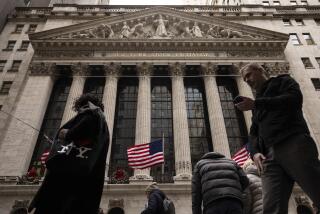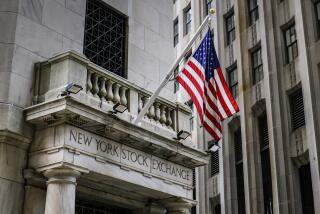Inflation News Depresses Market but Dow Rises 2.71
NEW YORK — Blue chip stocks managed to score a slight gain at the close of trading today, shrugging off concerns about a surprising run-up in inflation, but the broader market closed in the minus column.
The Dow Jones average of 30 industrials rose 2.71 to 2,765.77.
In the broader market, declining issues outnumbered advancers by about 5 to 4 on the New York Stock Exchange, with 656 up, 838 down and 497 unchanged.
Big Board volume totaled 127.99 million shares, against 142.81 million in the previous session.
The NYSE’s composite index fell 0.03 to 188.91.
At the American Stock Exchange, the market value index fell 2.26 to 354.72.
The market fell sharply at the opening after the government reported a 0.5% rise in the March Consumer Price Index. The Labor Department said the inflation rate for the first three months of 1990 was at its highest level in almost eight years.
Later in the session, the market repeated what has become a pattern in recent months. Blue chips recovered while the broader market stayed in the minus column.
Traders were particularly unnerved by a 0.7% rise in core inflation--prices excluding the volatile food and energy categories.
The government also reported industrial production rose 0.7% last month due in large part to increases in the output of automobiles following a major cutback in January.
Both reports wiped out hopes that the Federal Reserve might nudge interest rates lower any time soon. The Fed has been trying to keep inflation in check and the economy from overheating by keeping keeping rates relatively high.
Bond prices tumbled in early trading today as reports of high inflation and a strong economy triggered a sharp sell-off.
The Treasury’s benchmark 30-year bond was down 1 3/32 points, or $10.94 per $1,000 face amount, around midday. Its yield, which rises when prices fall, soared to 8.73% from 8.63% late Monday.
Economists said the combination of high inflation and an improved economy was a sign that the next move by the Federal Reserve would be to raise interest rates, which would depress bond prices.
Inflation is bad for the credit markets because it erodes the value of fixed-income securities such as bonds. A strong economy depresses bond prices because it reduces interest in Treasury securities, which are viewed as a safe haven in times of instability.
In the secondary market for Treasury bonds, prices of short-term governments were down 3/16 point to 5/16 point, intermediate maturities declined 13/32 point to 19/32 point and long-term issues were off 1 point to 1 7/32 points, according to Telerate Inc., the financial information service.
The movement of a point is equivalent to a change of $10 in the price of a bond with a $1,000 face value.
The Shearson Lehman Hutton Daily Treasury Bond Index, which measures price movements on all outstanding Treasury issues with maturities of a year or longer, was down 6.10 to 1,142.44.
More to Read
Inside the business of entertainment
The Wide Shot brings you news, analysis and insights on everything from streaming wars to production — and what it all means for the future.
You may occasionally receive promotional content from the Los Angeles Times.










